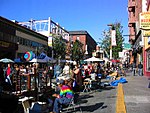Graduate Berkeley
1928 establishments in CaliforniaBuildings and structures in Berkeley, CaliforniaEconomy of Berkeley, CaliforniaHistoric hotels in the United StatesHotel buildings completed in 1928 ... and 4 more
Hotels in the San Francisco Bay AreaResidential buildings in Alameda County, CaliforniaSpanish Colonial Revival architecture in CaliforniaW. H. Weeks buildings

The Graduate Berkeley (Originally called the Hotel Durant or the Durant Hotel) is a historic boutique hotel located in Berkeley, California in the United States. It is located in downtown Berkeley, just off campus of the University of California, Berkeley. The hotel is listed on the Berkeley register of historic places.
Excerpt from the Wikipedia article Graduate Berkeley (License: CC BY-SA 3.0, Authors, Images).Graduate Berkeley
Durant Avenue, Berkeley
Geographical coordinates (GPS) Address Phone number Website External links Nearby Places Show on map
Geographical coordinates (GPS)
| Latitude | Longitude |
|---|---|
| N 37.868 ° | E -122.2563 ° |
Address
Graduate Berkeley (Hotel Durant)
Durant Avenue 2600
94704 Berkeley
California, United States
Open on Google Maps








